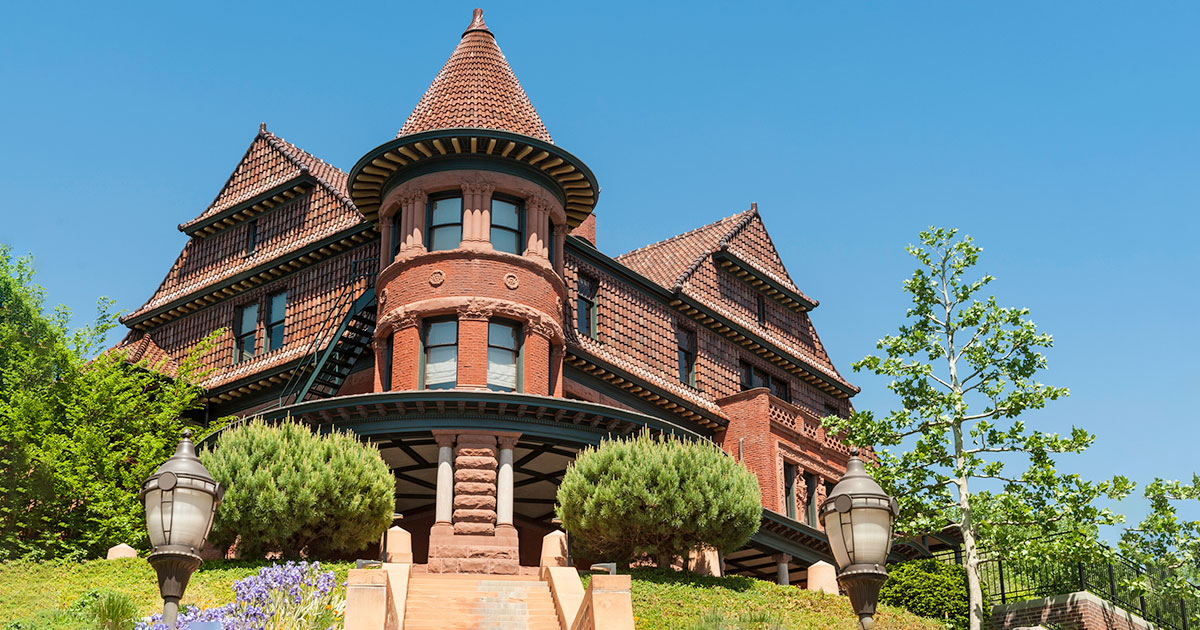
May 28, 2025 – The charm and craftsmanship of historic buildings are attractive to a lot of people, but owners might find themselves jumping through some unforeseen hoops if they are not aware of the restrictions that may apply if they want to update or change their property in any way.
Here are resources to help homeowners with legal challenges of owning a historic home.
The Wisconsin Historical Society
The Wisconsin Historical Society website is a great place to start when researching a historic property in Wisconsin. It has links to many of the resources discussed in this article –
check it out at wisconsinhistory.org.
The State and National Register of Historic Places
The
Wisconsin Historical Society website lists 160,416 national or state registers record of historic homes or landmarks.
 Amy Fels is the cataloging and metadata librarian at the Wisconsin State Law Library. She is a current member of the Academy of Certified Archivists.
Amy Fels is the cataloging and metadata librarian at the Wisconsin State Law Library. She is a current member of the Academy of Certified Archivists.
To start with, it is important to clarify that a privately owned house or building – that is listed individually or as part of a historic district on the
Wisconsin State Register of Historic Places or National Register of Historic Places – does not impose any restrictions on the owner.
These designations are honorific only, and the owner is free to sell, alter, or demolish the property if they want. Of course, it is hoped that the owners will recognize and respect the historical integrity of their listed property, but they are not legally obligated to do so.
The exception to this is if the owner wishes to use any federal or state historic tax credits or grants to help fund their projects. In that case, then the designated federal or state authority must review the proposed work to assess its historical appropriateness. In Wisconsin, this falls to the
State Historic Preservation Office (SHPO).
Local Historic Preservation Commissions
Local landmark or historic preservation ordinances might put homeowners in the trickiest position.
Unlike register listings, these ordinances – designed to protect the integrity of historically significant properties in a community – do impose legal restrictions on what individuals may or may not do with their privately owned property. Many Wisconsin cities have a
landmark or historic preservation commission made up of appointed community members who assist with designating local landmarks and historic districts and enforcing the local restrictions.
Typically, homeowners must present their proposed projects to their local landmark commission, and the commission must approve of the proposed work before a homeowner can move forward. If the homeowner’s project plan is denied, they must amend the proposed work to meet the criteria set by their local historic preservation ordinance.
A community’s planning commission or common council may also have authority to approve or deny proposed projects for locally landmarked properties, especially if there is a historic preservation plan in place. Restrictions can apply to construction materials used, paint colors, design elements, landscape features, and more.
Some communities have stricter ordinances than others, so it is vital that homeowners or prospective buyers be aware of these laws before planning any work on a designated historic home.
Tax Credit and Grant Programs
Officials recognize that the requirement to meet certain historical standards carries extra cost for private property owners. This is why state, federal, and local governments offer tax credit or grant programs to help offset that cost.
Find out more about the tax credit program for owners of historic homes via the
FAQ page on the Wisconsin Historical Society website.
You can also find out how to pursue grant funding on the
Wisconsin Historical Society website.
Building Code Exemptions
Sometimes, owning a historic home can come with unexpected surprises. But navigating repairs or renovations does not have to be intimidating. Whether it’s outdated wiring or a leaky window, if property owners are aware of their local historic preservation laws, they can ensure that any proposed work on their historically designated home is completed in a way that benefits them and their house, and still follows any legal restrictions that apply to their property.
The application of historic building codes also enables property owners to complete historically accurate work, even if that work does not meet modern building codes. Many older buildings simply do not – staircases can be narrow or steep, doorway widths inconsistent, construction methods outdated.
The State of Wisconsin adheres to the International Building Code.
Chapter 12 lays out the qualifications and restrictions for designation as a historic building. More information about these codes can be found on the Wisconsin Historical Society website’s
building codes and historic rehabilitation webpage.
Wisconsin Historic Preservation Laws and Regulations
The Wisconsin Historical Society has compiled a list of
Wisconsin’s major historic preservation statutes. Here are other relevant statutes and regulations:
Examples of Local Historic Preservation Ordinances
Other Useful Resources
Boost Your Research with Help from a Law Librarian
If you are feeling overwhelmed by the resources above or are still unsure where to start, contact a librarian! We are trained to assist patrons with finding and using the best resources for them and their unique legal research topics.
Reach out and ask your local law librarian for help with your research, or at these libraries:
